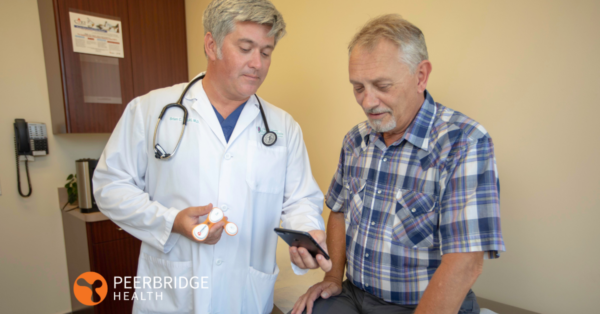Peerbridge Health announced a prospective clinical trial to demonstrate feasibility of delivering apnea hypopnea index (AHI), a common metric used to diagnose obstructive sleep apnea (OSA) severity, from the Peerbridge CorTM. AHI will be derived from the industry-leading waveform clarity of the Cor’s patented 3-lead, 2-channel wireless ambulatory ECG (AECG) wearable device. Enhancing the Cor’s ECG findings with a patient’s AHI score expedites diagnosis and treatment for OSA, which disproportionately affects those with cardiovascular disease (CVD).
Of the 92 million Americans with CVD, 40-80% also suffer from OSA, but it is underrecognized and undertreated in cardiovascular practice1. In fact, 82% of arrhythmia patients referred for ablation have undiagnosed sleep apnea2. OSA also doubles the risk for heart failure3, complex arrhythmias4, and stroke5.
“Obstructive sleep apnea is a major risk factor for cardiovascular disease, and identifying and treating this condition can significantly improve cardiovascular outcomes,” said Jeffrey Tyler, MD, FACC, RPVI, Interventional Cardiologist at Orange County Heart Institute and Research Center. “The ability to accurately provide AHI alongside arrythmia burden with the Peerbridge Cor – and eliminate the need for testing with additional devices – will greatly enhance diagnosis and ensure more informed treatment decisions to manage co-morbidities in our patients.”
Typically, AHI is derived from a polysomnography (PSG) test in a sleep center or a home sleep apnea test (HST). This clinical trial will establish Cor’s proficiency in computing direct-from-ECG AHI and its equivalence to AHI measurements derived from an approved HST. The AHI metric is widely accepted as a compliance, efficacy, and effectiveness metric for CPAP and other OSA therapies.
“Cardiac rhythm changes seen in continuous ECG have always been recognized as a very powerful clinical lens in the electrophysiology community,” said Peerbridge Health Founder and Chief Medical Officer Angelo Acquista, MD. “This clinical trial builds on my longstanding vision to improve the patient experience and quality of life by developing innovative remote monitoring technologies. Demonstrating the ability to derive AHI is an exciting proof point in our pursuit of a complete remote platform, including not only advanced heart diagnostics, but critical vital signs and additional clinical diagnostics throughout the body.”
Earlier this month, Peerbridge announced the initial phase of this clinical trial, focused on capturing AI-enabled on-demand ejection fraction (EF) from Cor. This functionality will allow physicians real-time, over-the-air access to this important heart function measurement – at any time and from anywhere, allowing faster diagnosis and treatment for patients with possible heart failure. With the addition of AHI, this trial is designed to benchmark accuracy of multiple indications from the same Cor ECG study in ambulatory settings.
“We are focused on pursuing AI-driven indications for improving health outcomes in high prevalence co-morbidities such as heart failure and OSA,” said Chris Darland, CEO of Peerbridge Health. “Peerbridge is committed to making remote healthcare simpler, more effective, and less costly – delivering the most important health metrics to physicians, no matter where their patients are located. Proving AHI and EF can be measured by Cor is only the beginning in our mission to transform remote diagnostics.”
Results for this trial are expected to be completed in July 2023.
1American Heart Association (2021). Sleep apnea worsens heart disease, yet often untreated. Retrieved from https://newsroom.heart.org/news/sleep-apnea-worsens-heart-disease-yet-often-untreated
2Shapira-Daniels, A., Mohanty, S., Contreras-Valdes, F.M., Tieu, H., Thomas, R.J., Natale, A., & Anter, E. (2020). Prevalence of Undiagnosed Sleep Apnea in Patients With Atrial Fibrillation and its Impact on Therapy. JACC: Clinical Electrophysiology, 12, 1499-1506
3Newsom, R. & Truong, K. (2021). Sleep apnea and heart disease. Retrieved from https://www.sleepfoundation.org/sleep-apnea/sleep-apnea-linked-heart-disease
4Latina JM, Estes NA 3rd, Garlitski AC. (2013). The Relationship between Obstructive Sleep Apnea and Atrial Fibrillation: A Complex Interplay. Retrieved from https://www.ncbi.nlm.nih.gov/pmc/articles/PMC3600315/
5Selim, B., Coo, B., Qin, L., Sangchoon, J., Won, C., et al. (2016). The Association between Nocturnal Cardiac Arrhythmias and Sleep-Disordered Breathing: The DREAM Study. Retrieved from https://jcsm.aasm.org/doi/10.5664/jcsm.5880




